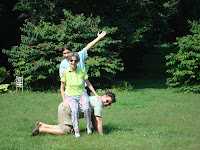
"In one of his most stunning utterances Nietzsche said that a joke is an epigram on the death of a feeling. * * A passing note. When Princess Diana died it took four or five days for the jokes to marinate. When John Kennedy Jr died the jokes were instantaneous, electronic, light-speed. The feeling, in other words, had no chance to exist; it was born dead. One wonders, too, about subsequent road kill on the information highway."It’s an unusual book, more moving in the depth of its completion than any of his novels, even Success and Money, my favorites. He tells the very busy, if at times too baroquely detailed, stories of a) his life up to the moment, b) his relationship with his family with a definite concentration on his father and c) the serial murder of his cousin when he was still a young man. The way he fractures the narrative in time and place is eerie, not quite right, but very poetical and atmospheric, and the three stories, with millions of other smaller stories, insult each other sometimes and cozy up at others. It’s not compelling formally but you enter deeply each scene and vignette. They’re either vivid or vicious (or both).
The photographs he includes in three sections are also intriguing because they’re not really in order and are deliberately misleading in their captions: photographs of his two wives, a couple of lovers, his parents and children and Philip Larkin, and then his cousin Parkington who was strangled (at least) by Frederick West, a particularly horrifying British serial murderer.
And Amis is devoted to poetry. His father was no small poet and his father’s best friend was Philip Larkin. He piggishly smokes cigarettes and drinks and lets it all hang out sexually, but he’s also very interested in how everything appears to him, the way people talk and impress and betray or are just silent toward each other to him, what’s the motivation?
from Jake by Kingsley Amis:
Jake did a quick run-through of women in his mind, not the ones he had known and dealt with in the past few months or years so much as all of them: their concern with the surface of things, with objects and appearances, with their surroundings and how they looked and sounded in them, with seeming to be better and to be right while getting everything wrong, their automatic assumption of the role of the injured party in any clash of wills, their certainty that a view is the more credible and useful for the fact that they hold it, their use of misunderstanding and misrepresentation as weapons of debate, their selective sensitivity to tones of voice, their unawareness of the difference in themselves between sincerity and insincerity, their interest in importance (together with noticeable inability to discriminate in that sphere), their fondness for general conversation and directionless discussion, their pre-emption of the major share of feeling, their exaggerated estimate of their own plausibility, their never listening and lots of other things like that, all according to him.









